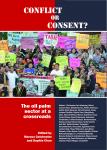
'Conflict or Consent?' Chapter 14: The BioPalm oil palm project: a case study in the Département of Océan, Cameroon
16 Dec 2013
This is the fourteenth chapter of 'Conflict or Consent? The oil palm sector at a crossroads'.IntroductionAn increasing trend in large-scale land acquisitions has been observed globally since about 2007 driven by rising food commodity prices, amongst other factors. This phenomenon has attracted the label of ‘land-grab’ due to widespread concern over the threats it presents to the human rights of communities living from the land being acquired. Africa has arguably been the region most affected by such land deals and the authors of this study have recently witnessed this trend in Cameroon. Coinciding with the moratorium on palm oil in Indonesia in 2011, at least four new large-scale oil palm plantation projects have been announced in Cameroon and several existing oil palm and rubber plantations are seeking to expand their current land allocations. This paper examines an oil palm plantation project planned by BioPalm/SIVA in the Océan department of Cameroon. It assesses the plans and processes undertaken by the project proponents, reports on the views of local communities and analyses the project’s compliance with national and international laws, with particular emphasis on the right to Free, Prior and Informed Consent (FPIC).



